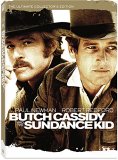| Reviews & Columns |
|
Reviews DVD TV on DVD Blu-ray 4K UHD International DVDs In Theaters Reviews by Studio Video Games Features Collector Series DVDs Easter Egg Database Interviews DVD Talk Radio Feature Articles Columns Anime Talk DVD Savant Horror DVDs The M.O.D. Squad Art House HD Talk Silent DVD
|
DVD Talk Forum |
|
|
| Resources |
|
DVD Price Search Customer Service #'s RCE Info Links |
|
Columns
|
|
|
Butch Cassidy and the Sundance Kid: 2-Disc Collector's Edition
Fox // PG // June 6, 2006
List Price: $26.98 [Buy now and save at Amazon]
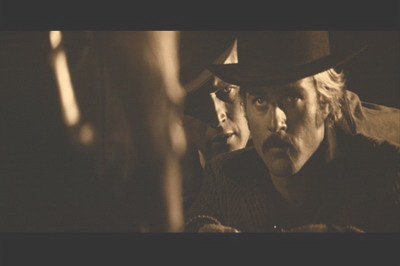
Outlaws Butch Cassidy (Paul Newman) and the Sundance Kid (Robert Redford) were at one time the supreme rulers of the Old West. But when an incredible superposse is amassed by one E.H. Harriman of the Union-Pacific Railroad with the sole purpose of capturing the two dead or alive, they know their days of robbing in America are at an end. Along with Sundance's girl Etta Place (Katherine Ross) they flee to Bolivia with intent to renew their notorious occupation. Unfortunately the times are changing everywhere and they find that wherever they go they are outnumbered and at a crossroads- their options are to either retire from lawlessness and drift into the obscurity of normal lives, or continue to steal at an ever-growing risk of having no life at all.
Directed by George Roy Hill, Butch Cassidy and the Sundance Kid is a film somewhat indicative of the movies of the time period in which it was made, but clearly stands out amid other cinematic offerings not possessing nearly the panache this movie holds and has attracted new audiences for going on forty years. Both subtle and leisurely paced, it draws the viewer in with a wide offering of intriguing elements and seems to invite one to ponder any number of attributes inherent to the human condition. It may not be the first thinking man's Western, but it's likely the most popular from its time period. It is hard to slap a description on this film that will tell a new viewer what to expect- its light hearted, a comedy, a tragedy, a Western, a somewhat cerebral action film. Its a character study into the workings of two outlaws who manage to somehow share the love of one woman with little animosity. Its a study into the workings of friendship; a sad look at obsolescence, regardless of the age of the dinosaur. One thing that enables a film to receive classic renown is its ability to entertain the viewer with repeated viewings, and almost four decades after this movie's debut its still alot of fun to watch.
Of significance is the fact that we are watching a movie about a time bittersweet in not only the lives of our 'heroes', but also the cold blooodedness of inevitable progress itself. We are only privy to snippets of information pointing to the glory years of Butch and Sundance, thus their careers and legends are not so much glorified as they are eulogized here; we witness a train robbery barely worth their undertaking, then another which forces them to leave the country or else meet their almost certain demise. We do witness a kind of semi-retirement they enjoy before leaving for Bolivia, but the pair have little desire to change in spite of their ever increasing difficulty in successfully being outlaws.
There are a number of telling ways in which it is conveyed throughout the movie that this is a story marking the end of an era. The opening credits show us footage of the Hole In The Wall Gang being portrayed in silent film. After this we watch Butch surveying the closing of a newly built bank, complete with electric alarms, closed heavy vaults, lock doored tellers windows, improved security- and hear Butch lamenting the passage of flawed but elegant simplicity in deference to improved but rather heartless efficiency. There is the advent of the bicycle, a early precursor to the automobile and the demise of the horse as transportation. The uber-posse of veritable lawman all-stars being amassed by the railroad with the sole purpose of putting an final end to Butch and Sundance robbing their trains and being seen as heroic to the everyman in their doing so. This band of lawmen were brought together with the sole purpose of taking the boys out, and it has been orchestrated in a calculated, ahead-thinking manner. Butch's old trail pal/sheriff Bledsoe tells the boys in no placating terms something he sees clearly that Butch and Sundance seem to be ignoring- they've inexplicably lived past their glory years, should long since have died in a manner worth their legend, regardless,their day is over and they are going to die bloody, plain and simple.
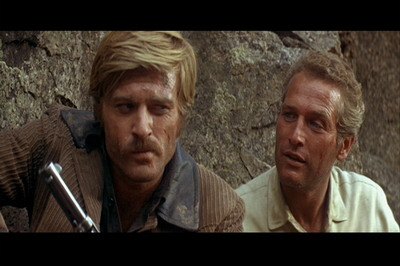
The Bolivia endeavors that make up the second half of the film are bittersweet in nature, showcasing their ill-fated renaissance period; after some irksome growing pains learning the language and habits of the locals, Butch and Sundance once more begin plying their trade with ever growing success and style in a country not used to such ingenuity. Unfortunately this also works against the boys, as the two Americans stand out in too many ways to the Bolivians to be able to blend in to the masses with any kind of long period of success. It isn't long before the description "banditos yankees" is on the tips of South American tongues and they begin feeling the pressure of giving up the game altogether, going straight. Unfortunately their attempt at leaving crime turns out to be bloodier than being bandits, and they quickly abandon the idea in spite of Etta's pleas to try something else such as farming or ranching. As a result, she quietly informs the two that she is 'leaving ahead of them' for home. She is their mutual muse, an angel in their midst, their tie to an existence more sane and domestic; she warned the two before leaving for Bolivia that the one thing she would not do is watch them die. Their refusal to give up robbery in spite of the ever increasing odds against them is an almost certain kiss of death; Etta knows it, solemnly leaving the two the next day. Of note there aren't any goodbye scenes between the three, in a sense conveying to the viewer that for Etta they were dead men long before she departed. Not in the eyes of the boys; up until their last moments, bleeding and amid gunfire they are searching for a way to continue their habit, their addiction- even if it means going to Australia. The Bolivian Army sees to it there are no more pages to be added to the legend.
Of all the things this movie manages to do right, the one most notable is its pairing of two incredibly popular stars- Newman and Redford. Newman of course was long since established at this point, and Redford was an actor already getting acclaim for his stage and comedic film work, just waiting for a role like this to push him into stardom. After this film they would combine forces again only on the popular 1974 offering The Sting, but for decades, in fact to this day, rumors and musings have surfaced from time to time about the possibility of the two making a new film together. The reasons for this are obvious. Any number of actors have been paired in projects both before and since in an effort to generate big box office revenue, but one would be hard pressed to name many more successful ones than this. It is tempting to call Butch Cassidy and the Sundance Kid the original buddy movie, though that would be a stretch. It is a piece of work in which we are given the impression that these two fine actors are equally important throughout the story; they share the screen together in a way so naturally one can hardly take one's eyes away from it. Most buddy movies of these times come across as jagged attempts to give each mega-star his due, showcasing a few blatant scenarios in which each can shine, then haphazardly throwing them both together in the spotlight; in almost all cases one preening superstar or another appears to be the winning 'alpha male'. Not so here. The respect and regard both actors seem to defer to one another on this project is undeniable- they work together as if they had known each other most of their lives. Newman and Redford is perhaps as graceful a pairing of actors as I've seen in any film.
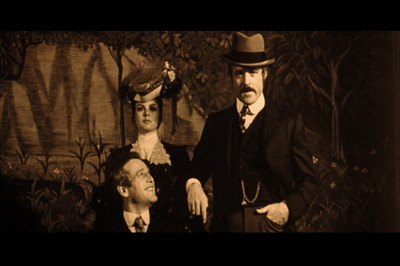
Newman is 12 years Redford's senior, but watching this movie I was surprised to discover this; they appear to be peers in both age and poise. Viewed so many years past this movie's debut the fact that Redford was still in the early stages of his career isn't as evident, as he has gone on to do so much successful work both as an actor and director in the decades since. That it was such an early effort for him is amazing. The Butch Cassidy role was almost certainly tailored for Paul Newman to play, for Newman comes across as Newman here; affable, graceful, cerebral, yet with a masculine magnetism women have swooned over decade after decade. While the tagline throughout revolves around Newman's Cassidy being the thinking man's outlaw, the take Redford gives on his Sundance character gives the impression of a man of equal depth and thoughtfulness. Their union seems seamless, the characters similar though different in their respective talents. Butch may be the thinker, but he's dangerous like a sleeping snake; Sundance may be the gunfighter, but he's capable of thinking his way out of trouble to improve his chances for survival. The almost constant stream of one liners and wordplay may seem out of place in what should be a Western about two outlaws, but there is little denying the fact that it is an integral reason why the movie is so well liked even today. Somewhere along the line the screenwriter, director and stars themselves turned what should be two blatantly different characters into twin sons of different mothers. You know what? It works. While this isn't the first buddy movie, it is probably the first to have been done this well and even in the decades since one is hard pressed to name a better example of the genre.
Much has been made over the years of the "Raindrops" sequence early in the film- the lighthearted love triangle of Redford, Newman and Ross shown in a dreamy, carefree moment at Etta's home that seems more than a little out of place in the movie. Granted, there are valid reasons for many people not liking this portion of the film; it has a watering down effect on what in many ways is just about a perfect movie; critics point to this segment in order to validate their claims the film being unworthy of such praise. It also seriously dates the movie in a way some don't see in a positive manner. In its defense, it is indicative of the filmmaking style of the times, heavy on lilting melodic pieces interspersed throughout many notable movies of the period (cases in point, The Graduate and Midnight Cowboy) and director Hill wanted this movie to have one as well; in reality there are three musical sequences in the movie, the difference being that fact that the other two have no lyrical content. Another forgiving point here is it does give the viewer a look at the bandits being more human, and validates the fact that when they make their escape to Bolivia, Etta is eventually in tow to the approval of both. Personally I think the film would have been a better one without the piece, but I've grown used to it and it doesn't nearly take away from my appreciation for the movie as a whole these days as it may have, say, 10 years ago. Noteworthy is the fact that Hal David and Burt Bacharach won an Oscar for best song because of "Raindrops Keep Falling On My Head", giving the movie one more bragging right and footnote in cinematic history. Love it or hate it, its there- and according to the documentary material is there because Hill insisted upon having it there.
Any number of points can be brought up as to why Butch Cassidy and the Sundance Kid is an enduring favorite decades later. Newman and Redford will always be the reason that stands above all others, but that in itself wouldn't keep the movie alive. The cinematography on this film bears mentioning; the scope and breadth of the West presented to the viewer is incredible. Director Hill crafted a film that evenhandedly paces action, comedy, and romance. While Katherine Ross may not seem to have a alot to say or do in the film, she speaks volumes with facial expressions conveying joy, excitement, concern and ultimately sad resignation. Its the kind of movie that stands out in the careers of all those involved with it regardless of their successes before and after.
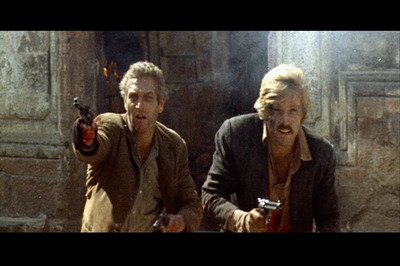
The DVD-
Butch Cassidy And The Sundance Kid is presented as a two disc set and comes in a standard-sized clear box with a cardboard slipcase; it also includes a fine insert with several pages of pictures from the movie as well as some tidbits which one would need to watch the various documentaries in order to discover.
Video-
The aspect ratio for the movie is 2.35:1 anamorphic widescreen. Picture quality on the old edition has always been irksome to me, but this new print is something I can easily live with. There is no comparison to the old release- get rid of it and double dip on this one. I watched this with a critical eye in 1080i and frankly was blown away. Colors are aptly rendered; at times they seem a bit on the weak side, but for the most part are very true; skin tones appear natural, blues and greens are rich and accurate and blacks here are deep black; I spotted nothing in the way of oversaturation. While there is some slight print damage, a good deal of care has been taken in cleaning up as well as sharpening the image; dirt here is negligable. Fox has finally turned this movie into one that is a visual treat to watch. Until an HD version hits the marketplace this should more than do the job.
Note: There is an HD version of this film available that was released on JVC's D-VHS format but I've never seen it and can't comment on how this one compares.
Audio-
Sound options here are Dolby Digital Stereo, the original mono track, as well as Spanish and French mono options. While nothing spectacular the stereo track does the job well enough with the action centered at the front.
Extras-
There is a wealth of additional content here, with something for just about anyone who is a fan of the movie. Some of it is a bit redundant but still worth checking out. Happily, all the extras from the first DVD release of this movie have made their way to this new edition, and are presented on disc one.
Disc One-
Commentary by director George Roy Hill, cinematographer Conrad Hall, lyricist Hal David and associate producer Robert Crawford Jr.- An interesting and insightful track giving several perspectives, with focus on why they came on board the movie as well as what makes it different in scope from the classic Western of the past.
Commentary by screenwriter William Goldman- Goldman reminisces about various happenings during the film shooting as well as giving insights as to how many scenes came to fruition.
The Making of Butch Cassidy and The Sundance Kid- Coming in at 40 minutes this documentary includes production footage as well as narration by Newman, Redford and Hill.
Disc Two-
All Of The Following Is True: The Making Of Butch Cassidy And The Sundance Kid- Clocking in at around 35 minutes this is a delightful documentary on the making of the movie with insights from all three major stars, Richard D. Zanuck, Burt Bacharach and a number of other figures connected with the movie. Much is made of the attempt to bring Steve McQueen in as Sundance but the ultimate failure to settle on star billing and the subsequent pairing of Newman with Redford, an almost mythical acting duo at this point. Also talked about here are the exorbitant price paid for the script- $400,000 at the time-the locations, camera work, inclusion of the Raindrops sequence, disagreements of the major players....a number of tidbits I was unaware of are brought to light here and this is pretty much essential watching for any fan of the movie.
The Wild Bunch: The True Tale of Butch & Sundance- A fact versus fiction look at Butch and Sundance, this 25 minute piece features interviews with various historians comapring the film to reported real life information.
History Through the Lens: Butch Cassidy and The Sundance Kid: Outlaws Out of Time- A more extensive documentary that looks at the history of Butch and Sundance as well as the making of the film, something of a hodge-podge of the other featurettes and documentaries also included here.
1994 (25th Anniversary) Interviews with Paul Newman, Robert Redford, Katherine Ross, writer William Goldman, and composer Burt Bacharach
Deleted Scene: Tent- with optional commentary by George Roy Hill
Theatrical Trailers
Production Notes
Alternate End Credit Roll A curious piece with different music and a somewhat more jaunty feel.
The Films Of Paul Newman
Featurette showcasing Newman with trailers from several of his movies.
Final Thoughts-
At first I was hesitant to grade this film as highly as I am here as so many new and improved editions of some fairly good movies seem to be finding their way to the marketplace this year, but few of them possess the renown of Butch Cassidy and the Sundance Kid or are so deserving of the praise of this rerelease. The fact that this is one of only two onscreen pairings of Newman and Redford (and in my opinion the best) makes this cerebral Western a virtual must for any film lover. This new edition offers a print that far surpasses its woefully inferior predecessor, as well as bringing the viewer a second disc of additional material that is worth delving into while porting over all the extras that were present on its first DVD appearance. Fox is to be applauded for the care taken with this edition of the benchmark Western, coming in at a street price of under $20 to boot. If you already own the old DVD version, toss it and buy this one anyway. If you don't own it at all, search this one out. 37 years after its theatrical release this is still a great movie to watch on a Saturday night, and it finally looks as good as most offerings you would see at the theatre. DVD Talk Collector's Series.
|
| Popular Reviews |
| Sponsored Links |
|
|
| Sponsored Links |
|
|
| Release List | Reviews | Shop | Newsletter | Forum | DVD Giveaways | Blu-Ray | Advertise |
|
Copyright 2024 DVDTalk.com All Rights Reserved. Legal Info, Privacy Policy, Terms of Use,
Manage Preferences,
Your Privacy Choices | |||||||









